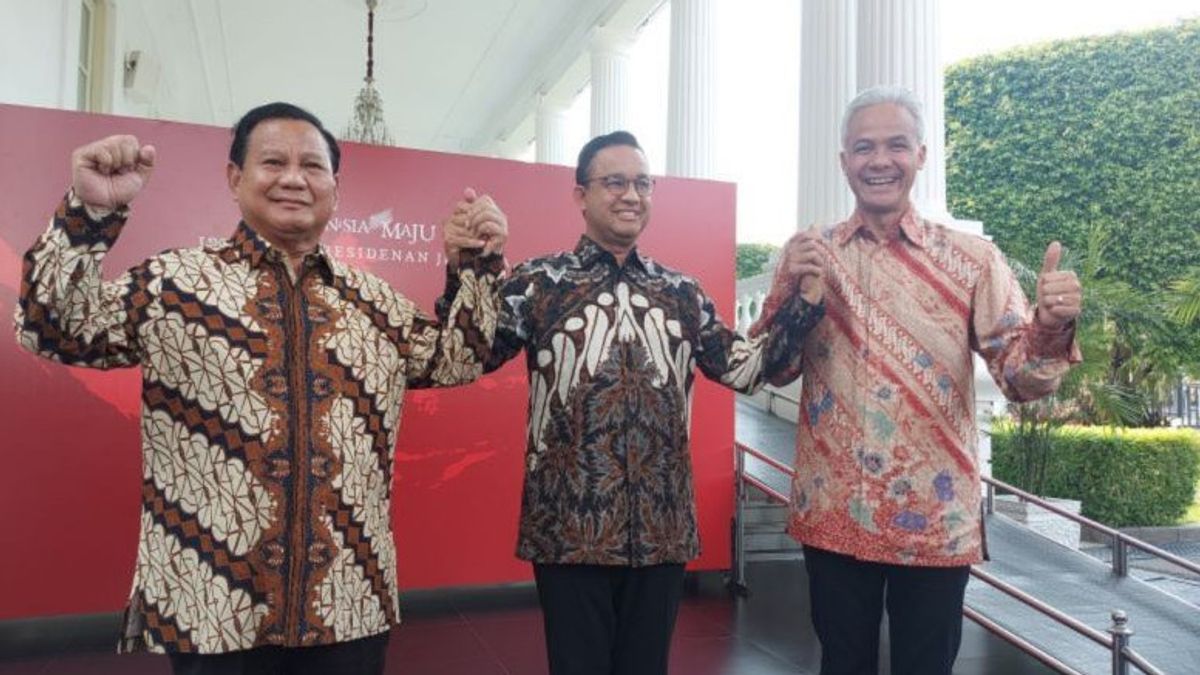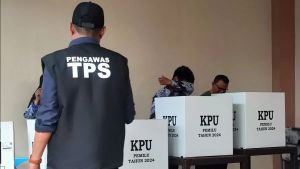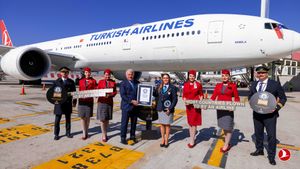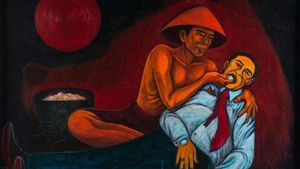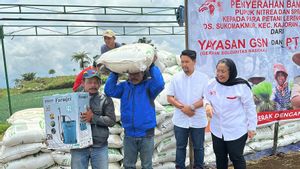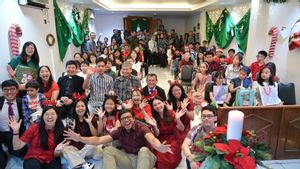The General Election Commission has determined three pairs of presidential and vice presidential candidates, namely Anies Baswedan-Muhaimin Iskandar, Ganjar Pranowo-Mahfud MD and Prabowo Subianto-Gibran RakabumingRaka on November 13, 2023. The pair serial number determination will be held the next day, November 14.
The three pairs of candidates (paslon) will compete in the 2024 presidential election by carrying out their respective vision and mission to develop Indonesia for the next 5 years or 2029.
The three candidate pairs have revealed their vision and mission after officially registering with the KPU, with the pair Anies-Muhaimin and Ganjar-Mahfud Md. registering on the same day when the presidential-cawapres registration period opens on October 19, 2023. Meanwhile, the Prabowo-Gibran pair registered on the last day, namely on October 25, 2023.
The Anies-Muhaimin pair carries the vision of "Indonesia Adil Makmur for All" and the mission of "Eight Roads Change".
Ganjar-Mahfud raised the vision of "Towards Indonesia Superior: Quick Action To Create A Fair And Lestari Maritime Country", with a mission called "Eight Rapid Action".
Then, Prabowo-Gibran brought the vision of "Together with Advanced Indonesia, Towards a Golden Indonesia 2045", with a mission entitled "Eight Asta Cita Missions".
One of the visions and missions of the three candidate pairs is economic equity, overcoming poverty, unemployment, and economic inequality.
Anies-Muhaimin
The couple who were promoted by the Change Coalition (NasDem, PKB, and PKS) brought the vision and mission entitled Indonesia Adil Makmur for all.
In achieving the mission of economic equity, the duet nicknamed Amin has several strategies, such as implementing a fair minimum wage and in accordance with regional conditions without burdening the employers and realizing the allocation of the state budget.
Anies-Muhaimin also wants to realize the leading cities as centers of growth to suppress inequality between regions.
In terms of infrastructure, both of them promise to improve infrastructure in disadvantaged areas to increase public access to participate in productive economic activities.
It is also written that economic equity is also carried out by strengthening and equalizing digital literacy among the community to take advantage of digital developments constructively.
In the vision and mission document it is written that candidate pair Amin promises to strengthen skills through training and assistance in coastal, archipelagic, and inland areas to increase the capacity to participate in productive economic activities.
For poverty alleviation, the Amin pair has a number of strategies, namely expanding business opportunities and creating jobs, realizing fair wages, ensuring economic progress based on independence and equity, and supporting successful corporations in their own country and growing in the global arena.
Ganjar-Mahfud MD
Ganjar-Mahfud MD was promoted by the PDI-P Party, the United Development Party (PPP), the Indonesian Unity Party (Perindo), and the People's Conscience Party (Hanura).
The couple carried the vision and mission entitled Towards Indonesia Unggul, which has a strategy to accelerate equitable economic development.
One of the efforts is to build 10 million houses with an easy and cheap financing scheme. The construction of new residences or renovations is in the form of simple houses, simple flats belonging to (rusunami), and simple rented flats (rusunawa).
This pair will provide strategic land for the housing. The location is affordable for the economic center, such as public transportation. The targets are low-income people, informal sector workers, laborers, and young people.
In addition, Ganjar-Mahfud will also repair slum villages in villages and cities by providing decent housing, healthy sanitation, drinking water and clean water, public facilities, and adequate open spaces.
The step to achieve equal distribution of other economic development is to carry out higher classes of villages. Ganjar-Mahfud will multiply quality village funds. The goal is to ensure that 50 percent of the total number of villages becomes independent, prosperous, and superior.
In order to equalize the economy, both of them also promised to expand and revitalize traditional markets. Public transportation will be more massive, comfortable, cheap, and connect shelters and workplaces. That way, villages and cities will grow together.
Regarding Papua, both will reduce the economic-social gap in this province. The trick is to provide special financial support, infrastructure investment, and tax incentives. The target is that Papua's economic growth is more equitable and improves the standard of living for its citizens.
Meanwhile, about poverty alleviation. Ganjar-Mahfud targets in missions number three and four to accelerate the development of a career economy based on knowledge and added value and accelerate equitable economic development.
Prabowo-Gibran
Regarding the vision and mission of equitable economic equality, the Prabowo and Gibran are committed to building from the village and from the bottom for poverty eradication.
One of the keys to quality economic growth, according to both of them is equitable distribution of the results of economic growth felt by all circles of society. Strengthening the economic scale and institutional development of MSME actors and entrepreneurship are important steps in equitable distribution of economic growth results.
Both will continue various credit programs for entrepreneurs and assistance for underprivileged communities. The new program offered is to form credit for startups or startups of millennials and Indonesian Healthy Cards (KIS) for the elderly.
Based on the vision-mission document, Prabowo-Gibran is committed to continuing downstreaming and industrialization based on natural resources (SDA), including around maritime to open the widest possible employment opportunities in realizing economic justice.
Downstreaming itself is a process or strategy of a country to increase the added value of its commodities. By downstreaming, commodities that were previously exported in raw form or raw materials are processed into semi-finished or finished goods.
Efforts to downstream and industrialize SDA-based will increase added value, employment opportunities, and other multiplier effects. Not only economically, but also the effect of social multipliers. Downstream efforts are carried out by ensuring the occurrence of technology transfers, developing local human resources, and protecting the environment.
Downstreaming has proven to have significantly increased regional economic growth in areas that have natural resources and encouraged economic equality and industrialization in eastern Indonesia.
Downstreaming that has been implemented, such as nickel products, will be continued and expanded by downstreaming bauxite, copper, tin, agro products, and maritime products.
The use of the maritime sector was also promised to be strengthened by paslonini to support the industrialization and development process of the blue economy.
The English, Chinese, Japanese, Arabic, and French versions are automatically generated by the AI. So there may still be inaccuracies in translating, please always see Indonesian as our main language. (system supported by DigitalSiber.id)
